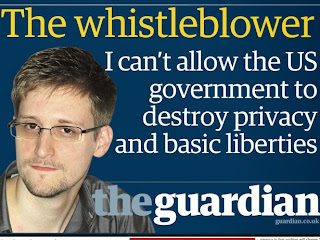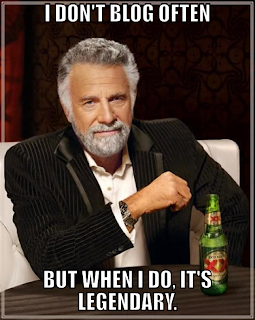Dedicated as a hero, Snowden should be praised and glorified as our global patriot. Having the courage and confidence to expose all those secret files to the population of the world, he received such compliments from nearly everyone. Except, obviously, to some agents that worked behind the scenes in these agencies that are fully disgusted and contemptuous. The world responded greatly of Snowden's actions and there are even movements being formed for the causes of human rights and the repudiation of espionage. Demonstrations also occur from many places around the world regarding the action the U.S should take in their reverberation for Edward Snowden.
Personally, maybe indefinitely, I can't speak for other people but, in my opinion, I will feel very intimidated and threatened if my privacy is invaded. I believe to the ideology that every one of us deserve a space where we are comfortable to do anything and everything without someone watching us every step of the way. The truth, in the end, is the most valuable thing anyone can have in terms of invasion of privacy and secrets. The U.S. Government will always deny this statement as they believe that monitoring their citizens and exposing their emails are the best strategies to look at other people's lives and eventually ruining it.
In my opinion, I believe that Edward Snowden deserve a medal for what he did. He truly justified the term ' privacy and human rights ' into the world. And people can see that, which is why exactly rallies are created to stop NSA and CIA to prosecute Snowden. When asked of his motivations to his actions, Snowden explained that " I have no intention of hiding who I am because I know I have done nothing wrong." I fully supported this statement and one hundred percent agree. Great minds think alike, they say. And I do believe that Edward Snowden's concept of privacy and human rights are no different than mine.
 Edward Snowden has to live in pain and pay the price (reputation, recognition, respect) in order to stood up for something that he believed in. He did that for all of us, as he also knows that he holds one of the major power to uncover the truth of what the U.S. Government is doing to humanity.
Edward Snowden has to live in pain and pay the price (reputation, recognition, respect) in order to stood up for something that he believed in. He did that for all of us, as he also knows that he holds one of the major power to uncover the truth of what the U.S. Government is doing to humanity.Even his father says that he did the right there. Further argument can be found here. Further to my research, I also found that Edward Snowden has been nominated for a Nobel Peace Prize by a Swedish sociology professor. The article can be viewed here. Many people knows that he did the right thing and they also acted and supported his actions and decisions by creating political rallies and demonstration around the world to show their signs and that they are behind Snowden all the way.
"I think that the public is owed an explanation of the motivations behind the people who make these disclosures that are outside of the democratic model" was Snowden's response when asked what motivated him to do what he did. As one of many supporters of Snowden, I strongly argue that he did the right thing and intentions to deliver his message to everyone globally. Although with great power comes great responsibility, obviously Snowden will receive great critics and consequences from U.S. government.
I find it very ironic how the United States is the oldest country in the world that has the oldest regime, rules and convention about Human Rights but it is their own government that contradict their own laws. Imagine how Americans feel knowing that every single day they wake up, that they are not free even though it's a "free country". So many conflicts and issues are surrounding the U.S government and its citizens due to their disloyalty and dishonour for the people of U.S.A.
Snowden believes that his greatest fear, after all disclosures of the classified documents and evidence, is that nothing will change. He stated in the video below, in the interview, that despite everything he's been into and leaving everything behind, he's afraid that the people (civilians) will not put in enough efforts to fight for what they believe in and force their representatives to take a stand against the U.S. government for what they did to the American public. Snowden also declared how the in the future, if the people did nothing against this absurdity, that the power and policy will get even stronger, and by that time, there's nothing that even the citizens can do anything about it.
Through all his troubles, Snowden did received many supporters, which can be seen here. They all believe and approve his move towards the humanity, privacy and human rights of the people of America. The U.S. citizens obviously seen the damage their government did to their country and they thanked their hero for doing the right thing.
I also would do the same thing if I live in the U.S. As a democrat myself, I believe in the privacy rights of the citizen. And I do regard to the fact that if these such things would continue to happen in the future, eventually as technology get more advanced, the surveillance and filtering will be unstoppable. People will eventually live in fear and anxiety because they're afraid that no matter what, when, how and where they live their everyday lives, someone will always be watching. And it is an extremely uncomfortable feeling and bitter environment we would live in.
" I don't want to live in a society that does these sorts of things [surveillance on its citizens]. . . . I do not want to live in a world where everything I do and say is recorded. . . My sole motive is to inform the public as to that which is done in their name and that which is done against them." That was Snowden's explanation to the regards of his actions. Two of the most extremely powerful reasons why he did what he did. And I truly back that up. We, as the conscious united population of the world, should know and understand this idea and apply it to our everyday life by showing our gratitude and acknowledgment to our globalised patriot Edward Snowden. Without whom, we would not be as free and exempt from the surveillance of these contradictory U.S. agencies. We should hail our hero. We should support and defend him together as we are stronger if we're united as the population of the world. Long live Edward Snowden.
Photo Source (1):
http://www.ndtv.com/news/images/snowden_protests_295.jpg
Photo Source (2):
http://www.niemanlab.org/images/edward-snowden-protest-cc.jpg
Photo Source (3):
http://wagingnonviolence.org/wp-content/uploads/2013/06/what-do-you-think-of-national-security-leaker-edward-snowden-poll-615x461.jpg
Video:
http://www.youtube.com/watch?v=5yB3n9fu-rM
References:
Ritzer, George and Jurgenson, Nathan 2010 'Production, Consumption, Prosumption: The nature of capitalism in the age of the digital 'prosumer', Journal of Consumer Culture , vol. 10 no. 1, pp. 13-36.

















